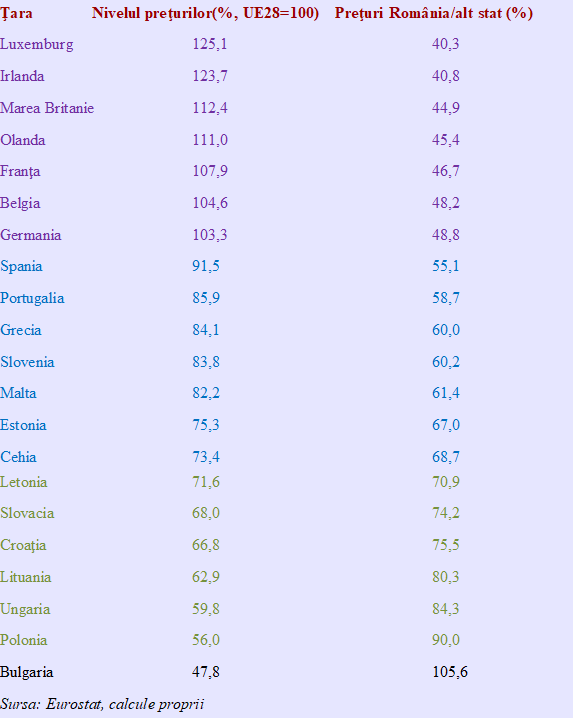 When publishing the data on wage levels and purchasing power in the EU member states, Eurostat also implicitly offered the first estimates of the relative price levels in these countries.
When publishing the data on wage levels and purchasing power in the EU member states, Eurostat also implicitly offered the first estimates of the relative price levels in these countries.
Somehow surprisingly, Romania displays a level of 50.44% of the European average prices, somewhat lower than in previous years.
This is our position compared to the countries on which this data has been calculated at the beginning of this year, according to the harmonized statistical data of the European statistical office (states that have not declared a legal minimum level of the national gross wage are not included):
Country Level of prices (%, EU28 =100) Prices in Romania/other country (%)
We can notice how the price level in Romania is currently less than half that of countries such as France, Germany, the Netherlands or Belgium and is still under 70% compared to former socialist countries such as Slovenia, Estonia and the Czech Republic, more developed but also located in the proximity of the Western markets.
The closest to us are Hungary and Poland, compared to which the 10% – 15% gap explains why we have a very pronounced deficit in the trade relationship. Simply, when we receive extra money in our pocket, it is very easy for the consumer goods industries in these countries to adapt to the new quality/price ratio already used on their domestic market.
The only EU country with lower prices than us is Bulgaria. That, along with their more inspired approach in the tourism and their vicinity, leads to the attractiveness that this country has for Romanians who come to spend holidays here, and this in mass proportions.
Of course, it is about an average of the prices for the 12 categories of goods and services considered by Eurostat, to obtain the actual purchasing power of the nominal amounts used in each member state.
What we must remember, though, is that we must find an optimal balance between the inevitable rise in prices occurring in a convergent process that cannot be stopped and the preservation of the purchasing power of the amounts earned in Romanian Lei. A purchasing power that can only be maintained by results as close to zero as possible or even positive, if possible, in the trade exchanges between these partner countries.
Otherwise, price increases without increases in competitiveness and productivity (both are relative, as others don’t stand still!) can push us, on the path of some income support granted without any basis in the real economy, towards Greece’s situation. Joined prematurely to the Eurozone and unable to adjust its prices to the new realities.










